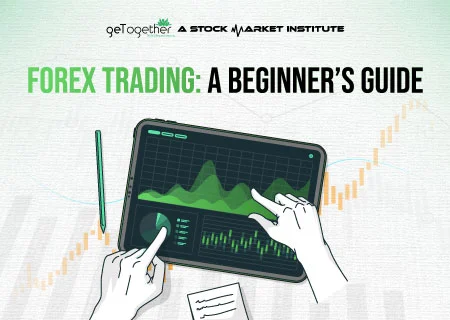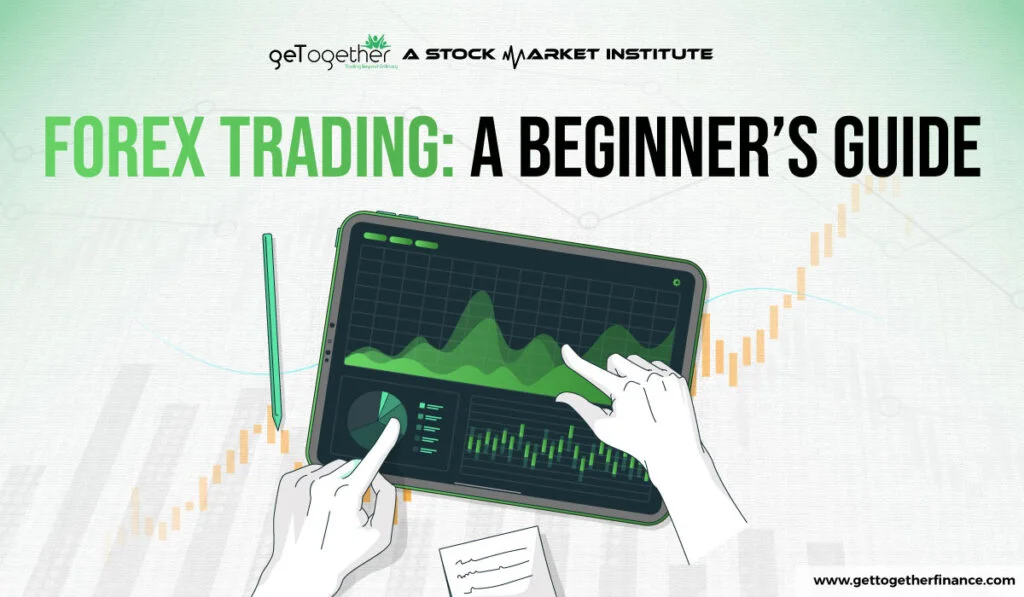Forex Trading: A beginner’s Guide
- June 26, 2024
- 1903 Views
- by Manaswi Agarwal


Forex Trading is executed worldwide on the foreign exchange market which is the world’s largest and most liquid asset market. The market is much volatile as compared to the Indian equity market and operates quite differently. The essence of forex trading is about identifying the changing values of currencies at the right time and catching every moment of change in currency values. Before diving deep into forex trading, we will first get to know about the forex market.
Table of Contents
ToggleWhat is the Forex or Foreign Exchange Market?

Forex or Foreign Exchange market is a global marketplace for the exchange of national currencies. The currencies in this market are traded over the counter and the transactions are placed via computer network. Forex Trading which actually means currency trading is the activity of buying and selling of currency pairs in the forex exchange market to earn profits through speculation. The exchange of national currencies which is based on currency pairs takes place in the forex market. Foreign Exchange Market is open for 24 hours a day, five days a week.
What is Forex Trading?

Forex Trading is quickly recognizing the changing value of one currency against another currency. The currencies in foreign markets are traded against each other as traded pairs, for instance, USD/INR is one currency pair which depicts the trading of U.S. dollar against Indian Rupee. Suppose you believe that the USD will increase in value against INR, this speculation is traded by holding a long position.
In India forex trading is legally allowed in Indian pair currencies like USD/INR or EUR/INR in futures. In India spot forex trading is not legal, international forex trading allows spot, futures and forwards trading. Moreover, in international forex trading, any pair of currency such as USD/INR, EUR/USD can be traded by traders. In the spot market, trading is executed by buying slots that are available in multiples such as 0.1, 0.2, 0.3, etc.
What are the Advantages of Foreign Exchange Market?

Market participants who are engaged in forex trading activities can make informed decisions by knowing each and every aspect of the foreign exchange market. It can guide them about their next move to participate in the market actively.
Also Read: Most Tradable Currencies
Leverage
Forex trading allows traders to gain large profits by investing small amounts as it offers leverage buying indicating that traders can hold large positions with small amounts of capital. This increases the potential gains as well as imposes a high amount of risk.
Transparency
In foreign exchange market, traders are offered transparency as the real time price data is available to all the participants in the market according to which they can make sound decisions, so the market is highly transparent.
Accessibility
Any individual interested in the foreign exchange market can access the market with an internet connection. Foreign currency market is open 24 hours a week.
International Market
Forex market is an international or global market that means it can be accessed by international businesses where they can manage their currency risks.
Reduced Transaction Costs
The transaction costs incurred in forex trading is comparatively much lower than the costs incurred in other financial markets.
Disadvantages of Foreign Exchange Markets

To become a successful forex trader, it is essential to understand various cons of the forex market which helps a trader to protect themselves from unnecessary trading.
Market Volatility
Market volatility is quite high in the forex market due to which there are sudden movements in the price action that can result in losing money for traders.
Competitive and Risky
The forex market is highly competitive and risky as there are limited rules and regulations. The risk is high because of increased competition and high volatility of the market.
Complexity
The foreign exchange market is very complex to understand, additionally, there are various barriers related to experience, and capital requirements which makes trading more complicated in this market.
Regulatory Challenges
In forex trading, certain tax impositions and frequent changes of rules and regulations affect the sentiments of traders. The brokers have to undergo various levels of regulations which vary from country to country.
Factors affecting Forex Markets

Trading in the forex market requires an immense amount of knowledge about the financial market and the factors that can have a great influence on the market activities. Exchange rate of a currency, which is the value of one currency relative to another, is highly determined by the demand and supply forces in the market. Several other factors such as economic indicators, geopolitical events, market sentiments, natural disasters and central bank policies might influence the exchange rate of a currency in the market.
Political Conditions
Political stability influences the working of foreign exchange impacting the value of currency drastically. The influence of geopolitical events such as wars, elections, policy changes, and change in government creates a volatile situation in the exchange market deviating currency values.
Economic Factors
Apart from the political situations, various economic factors such as inflation rates, interest rates and GDP growth play a significant role in influencing the value of a currency. For instance if there is an increase in the interest rates by the central bank then it results in the hike of currency value through which foreign investors can earn significant profits.
Market Psychology
The liquidity in the market gets affected by the perception of traders and foreign investors as speculative trends in the market can push the prices towards unexpected levels that could be in either positive or negative direction.
Cut It Short
Forex trading is very complex and must be performed after appropriate measures are taken to avoid the risks of high volatility in the market. A comprehensive understanding of discipline, economics, politics, market behavior is required to gain exclusive returns from the market while avoiding the possible traps.
FAQs
What is Forex Trading?
Forex Trading is the change in value of one currency relative to another currency. It is done by capturing the moves of currencies in demand or supply zones.
Is Forex Trading legal in India?
Forex trading is legal in India with heavy imposition of rules and regulations from SEBI and RBI.
Which are the Forex Trading Platforms?
The platforms that you can use to execute forex trading are: Avatrade, Liteforex, Justforex, PrimeXBT, etc.
How to trade Forex in India?
Forex in India, you can either work with a SEBI regulated broker that offers exchange-traded currency or with a trustworthy and regulated foreign broker.



 Instagram
Instagram
